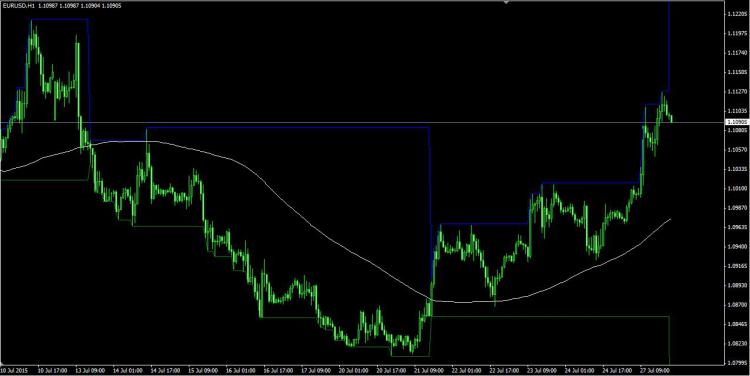I am not sure what you want to do but if
marketpoint = i+1;
and tracedistance = marketpoint - i;
then tracedistance = i+1-i = 1;
doing this would give à point, so the buffer has to be an arrow_style buffer :
extern int tracedistance= 20; // 20 bars
ExtMapBuffer1[i]=High[ArrayMaximum(High,tracedistance,markerpoint)]; ExtMapBuffer3[i]=Low[ArrayMinimum(Low,tracedistance,markerpoint)];
Hi,
I just want to not have the line buffers flare off up and down on the current bar and just continue to plot the current array high and low.
//ffoorr - trace distance cannot be 1. the value of marketpoint is set as current bar i when the condition is met and saved for calculation against realtime var i.
First of all, I believe that you should never assume that a variable is automatically initialised to 0
int markerpoint=0, tracedistance=0;
Not tested
tracedistance=markerpoint-i; //Trace high low from markers: if(tracedistance>0) { ExtMapBuffer1[i]=High[ArrayMaximum(High,tracedistance,i)]; ExtMapBuffer3[i]=Low[ArrayMinimum(Low,tracedistance,i)]; } else { ExtMapBuffer1[i]=ExtMapBuffer1[i+1]; ExtMapBuffer3[i]=ExtMapBuffer3[i+1]; }
but it may help towards solving your problem.
I think that you still have further work to do as the indicator will not work properly when i==0
First of all, I believe that you should never assume that a variable is automatically initialised to 0
Not tested
but it may help towards solving your problem.
I think that you still have further work to do as the indicator will not work properly when i==0
Bingo, its working!
GumiRai, Thanks for pointing me in the right direction!
What solved it was declaring " int markerpoint=0, tracedistance=0; " in the global section instead of inside of the " int start() " function. To be honest, I don't completely understand the logic of why that works (hence I never solved it on my own in the first place).
Could you please give a brief explanation as to why you think this made it work, I'm trying to become a better mql programmer. I appreciate the help!
Bingo, its working!
GumiRai, Thanks for pointing me in the right direction!
What solved it was declaring " int markerpoint=0, tracedistance=0; " in the global section instead of inside of the " int start() " function. To be honest, I don't completely understand the logic of why that works (hence I never solved it on my own in the first place).
Could you please give a brief explanation as to why you think this made it work, I'm trying to become a better mql programmer. I appreciate the help!
//Markers: if ( (Close[i] > ExtMapBuffer0[i]) && (Close[i+1] <= ExtMapBuffer0[i+1]) ) { markerpoint = i+1; } if ( (Close[i] < ExtMapBuffer0[i]) && (Close[i+1] >= ExtMapBuffer0[i+1]) ) { markerpoint = i+1; } tracedistance = markerpoint-i;
Following the first call, i will =0 on subsequent ticks.
if the variables are declared locally and assuming initialised at 0
if neither of the conditions are true
markerpoint remains unchanged at 0
Therefore
tracedistance = markerpoint-i;
tracedistance = 0-i;
tracedistance = 0-0;
tracedistance = 0;
ExtMapBuffer1[i]=High[ArrayMaximum(High,tracedistance,i)]; ExtMapBuffer3[i]=Low[ArrayMinimum(Low,tracedistance,i)];
will be
ExtMapBuffer1[i]=High[ArrayMaximum(High,0,0)]; ExtMapBuffer3[i]=Low[ArrayMinimum(Low,0,0)];
Which will give strange results, I believe that it defaults to the high and low of the whole array
What is needed is rather what you aim to do, cause it's confuse :
Could you please give a brief explanation as to why you think this made it workAre you talking about the ima 100 line buffer ?
the line buffers flare off up and down on the current bar
- Free trading apps
- Over 8,000 signals for copying
- Economic news for exploring financial markets
You agree to website policy and terms of use
Hi,
To Anyone who can shed some light:
I'm plotting the Highest High and Lowest Low in Line style buffers, the number of bars look back is counted since the last crossover of close price moving above or below a 100 SMA.
The problem is that on the current bar(most recent) the buffers flare up and down and I'm unsure how to correct this, I'll attach a picture and my code for further clarification.
I'd appreciate a solution, Thank you!

Here is the Code I am using: